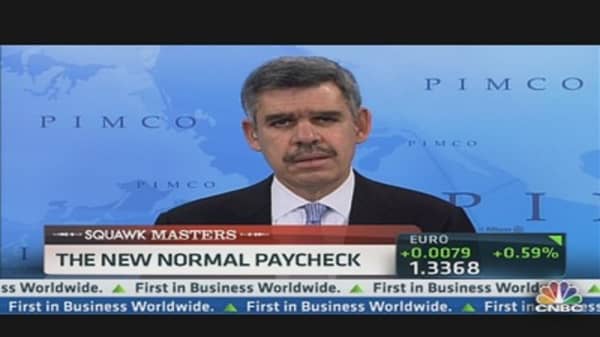In the years since his proclamation, El-Erian said, "The 'new normal' allowed time for the corporate sector to heal, for the housing sector to heal, and that's positive. That's how you come out of [it]."
He was not ready in Thursday's interview to say when the "new normal" would end, but he did lay out what might happen when it does.
"Everybody wants the positive tale, which is we tip into higher growth, lower unemployment, and we deal with our debt issues through economic growth." But he warned, "We have to be careful because the other tale ... Europe doesn't get its act together, the Middle East gets more complicated."
(Read More: El-Erian Op-Ed: Will What Happens in Japan Stay in Japan?)
In the near-term, El-Erian stressed the importance for the U.S. government to get its financial house in order. "As investors, it's not just about top-line revenue growth. It's not just about the economy. It's also about political risk and policy risk."
Washington started off the new year with an agreement on the tax increase portion of the "fiscal cliff" but delayed the automatic spending cuts, known as the "sequester," for two months. (Learn More Here)
So President Barack Obama and Congress still need to replace the "sequester" with more targeted spending reductions, while dealing with the need to raise the debt ceiling and approving the funding to keep the federal government from shutting down.
(Read More: More Conservatives Tell GOP: Don't Mess With Debt Ceiling)
"You've got three events. It's not clear which one you use to calibrate your clock," said El-Erian, who was not betting on a comprehensive deal to address all issues. "It will not be the grand bargain. It may not even be the mini-bargain. It's going to be another one of these micro-deals that simply kicks the can down the road."
(Read More: Debt Ceiling Battle: Why No One Agrees on Anything)
El-Erian added that Washington needs to enable economic growth, instead of creating headwinds.
—By CNBC's Matthew J. Belvedere; Follow him on Twitter @Matt_SquawkCNBC




